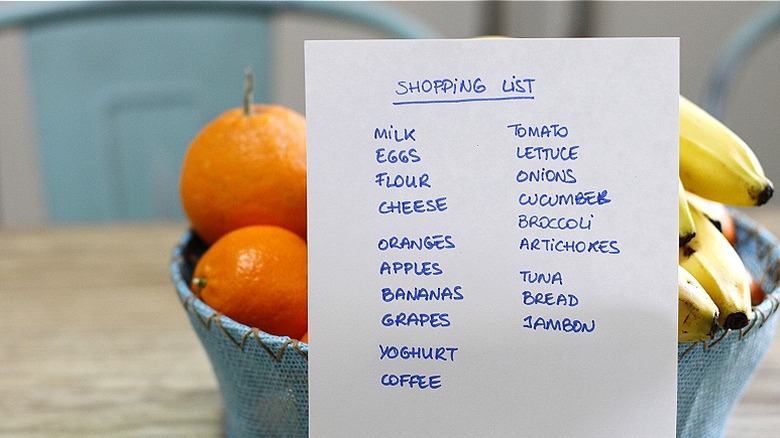5 Ways You're Destroying Your Budget (And Not Even Know It)
We may receive a commission on purchases made from links.
Financial stability isn't something that you luck into or you find yourself born with; instead, creating financial stability is a task that everyone needs to busy themselves with. This starts with good budget balance, and a willingness to understand where you might have strayed in the past. However, it's also important to realize that many people showcase a sort of blind spot when it comes to budgeting, and it's not exactly their fault. The Council for Economic Education reports that the number of states that require high schoolers to take a course in personal finance in order to graduate has increased to 35 as of 2024, up from 23 in 2022. While this is heading in the right direction, it underscores that for most adults today, financial literacy was not part of their curriculum.
We spoke with Matt Schulz, a personal finance speaker, educator, and author of "Ask Questions, Save Money, Make More," about ways that consumers can avoid destroying their budgets, as well as instill better budgeting habits in their routine. He gave us a framework of weaknesses many people fall victim to, and we discussed ways to turn the table on these trouble spots. "First, don't be afraid to course-correct," said Schulz. "If your current budget-planning methods don't seem like the best fit for you, try something else. If something has happened and you need to re-prioritize some spending, do it. Budgets are meant to be living, breathing documents. They're not carved into stone. They're meant to change and be tweaked." With that in mind, our dialogue turned toward sore spots and how to defeat them.
1. Not planning ahead
Creating a budget is a great first step; however, it takes continued planning to execute that spending strategy. Challenges are placed in your way on a daily basis, and consumers who aren't prepared to navigate these hurdles and potential pitfalls may find themselves blowing their budget before it even has a chance. One area where this is particularly prevalent is at the supermarket. "The simple act of making a list gives you focus when you shop," Matt Schulz said. Note that grocery stores are especially adept at creating upselling opportunities for themselves — at your expense. (For example, here are 17 ways grocery stores trick you into spending more money.)
According to Schulz, "Rather than just browsing and looking for inspiration, you're going in on a mission to find exactly what you're looking for. That probably makes you less susceptible to impulse shopping, which is a budget killer." A shopping list, no matter what kind of shopping you're doing (whether it be for groceries or new clothes) makes the process faster, smoother, and less fraught with budgetary risk. It's a reality of shopping that the longer you remain in a store, the lower your guard against impulse spending becomes.
Armed with a shopping list, though, you're better able to ward off additional, and often frivolous, spending. As a first line of defense against overspending, a shopping list is an easy asset to bring into the fold and can make a significant difference.
2. Not shopping around
Matt Schulz also notes that product knowledge plays a major role in maintaining a balanced budget. Specifically, he advocates doing your homework on purchases in order to get the best deal possible. If two different stores sell the same thing, but for two different prices, there's absolutely no reason to spend more on something when you don't have to. "It takes time," he admits, "but the truth is that there can be major, major differences in prices between items in different stores. If you only shop at one store all the time, that loyalty could be leading you to overspend."
With the help of the internet and an abundance of e-commerce retailers out in the marketplace, it's possible to explore pricing discrepancies among (sometimes) dozens of physical shops and digital storefronts that carry the exact same product. You might often find small price gaps, but every once in a while there will be a dramatic gulf between advertised prices. Whether it's a purchase you've been saving up for (or perhaps even plan to splurge on), or a routine spending category like gasoline or batteries, the inability to find a competitive price can sink your budget. Spend the extra time to hunt down bargain prices and you'll enjoy far more breathing room in your personal finances. (On that note as well, this tip will help you stop compulsive spending.)
3. Not being willing to negotiate
Nearly everything is at least somewhat negotiable when it comes to price. You certainly won't find much luck trying to haggle over a loaf of bread at the grocery store; however, most consumers are probably familiar with discounts on damaged items or open boxes — even in large retail chains. Negotiation is a human tradition that has fallen by the wayside in many respects when it comes to routine consumer behavior.
People just leave too many opportunities to bag discounts on the table these days, and Matt Schulz targets this failing as an important area in which budget management can be drastically improved. "Whether you're trying to save a few bucks on your cable or cellphone bill or you're trying to knock a few hundred dollars off the price of that refrigerator or couch you're buying, failure to at least ask for a competitor price-match or other breaks can lead you to spend more money than you need to," Schulz said.
Even though it might be hard to break from the normalized behavior of simply accepting a stated price, the "ask" can make a huge difference in your ongoing budgetary math. "In my book," Schulz explained, "I walk the reader through dozens of scenarios in which they can negotiate over price or ask for other financial help from businesses. I even include word-for-word scripts to help people know what to say. It's like your parents always told you: It can't hurt to ask."
4. Not budgeting for your passion
Passion projects are an important part of anyone's lifestyle. No matter what it is you love to do, it's crucially important to make time for your hobbies, interests, and passions. For some, this might be frequenting your favorite sports team's home games or going fishing with your friends. Others might enjoy cooking fancy meals for themselves or playing the guitar. The truth is that nearly any hobby or interest you might hold close to your heart involves some kind of financial commitment, even if it might not be a large one. Matt Schulz suggests that "if you love it and you spend a fair amount of money on it throughout the year, it should be accounted for in your budget, no matter what it is."
"We think nothing of line items for travel, concerts, and dining out, but it may seem weird to include a more obscure hobby or passion in a budget. It shouldn't. All leaving it out of your budget does is set you up for failure," said Schulz. Indeed, for anglers who get out on the water every weekend, it might seem obvious to include maintenance and gas expenses to operate the boat, but smaller action items, such as bait and license fees, can easily slip through the cracks. Yet any routine expense that plays a role in your lifestyle should be accounted for. Otherwise, you'll end up behind on your budget, all because you initially didn't add in the extra 50 bucks you spend on essential extras each month! (Check out common monthly expenses you forget to budget for.)
5. Not updating your budget enough
Matt Schulz points out that your budget is a living, evolving financial feature. "When you build a budget," he said, "you make plenty of assumptions." These range from the average number of times you'll need to fill the tank each month to the expected cost of electricity to power your home. Both figures can shift wildly throughout the year, and prices can equally experience a life of their own.
"The problem is that times change, prices change, and spending habits change, so your budget assumptions should change from time to time with them," explained Schulz. For example, if you haven't updated your budget in six months to a year, there's a good chance that inflation has made your budget no longer accurate. That can lead to trouble when bills come due." Taking the time to explore changes in your outgoing expenses — either because your needs have changed, or because prices are experiencing a change — is crucial. You don't have to go overboard, but two check-ins a year can go a long way to greater budgetary health.
Finally, Matt Schulz offered this parting wisdom: "Don't go it alone. There can be a lot of shame when you're struggling financially, so many people choose to keep their problems to themselves. However, it is impossible to overstate the impact of having people cheering you on and helping you stay on track. That doesn't mean that you have to open your books to everyone, nor does it mean that letting some people in, even just a little bit, can make a difference. People want to help, whether emotionally, financially, or otherwise. Don't be afraid to let them."





